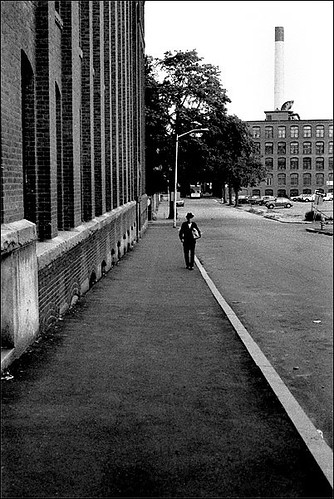
Robert M. Johnson is a street photographer who has captured images of life in Worcester and around the country for decades. My wife and I first became aware of his work years ago from an article in a local Worcester magazine. We lived in Worcester at the time, and so we shared our discovery with our friend Damien Gaudet. Damien is himself a talented photographer, so when Robert agreed to answer some questions for the blog, I asked Damien for some help. Damien composed a wonderful set of questions, so I decided to use them exactly as he wrote them.
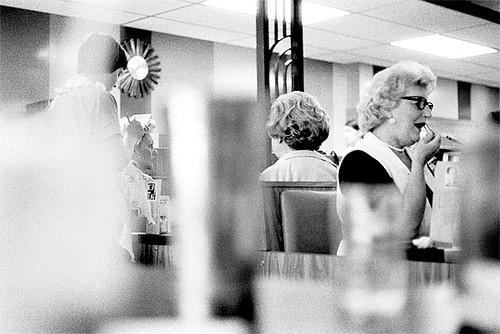
Before I get to Damien's questions and Robert's replies, I'd like to take a quick moment to say a few words about Robert's work. Across the spectrum of photographic genres, few take a little equipment and as much skill as street photography. It's the art of capturing a moment as it exists, and Robert does this wonderfully. His subjects are intriguing and interesting people, usually in action, always a part of the environment they're interacting with. He ranges from street scenes to shots of television screens that capture iconic moments in history. Robert entitles nearly all his photographs "Street - Documentary," though, as a former Worcesterite and admirer of his work, I believe he could confidently entitle them "Life - Documentary." See more of Robert's photographs on his Flickr page or at his website, Fullframeimages.com.
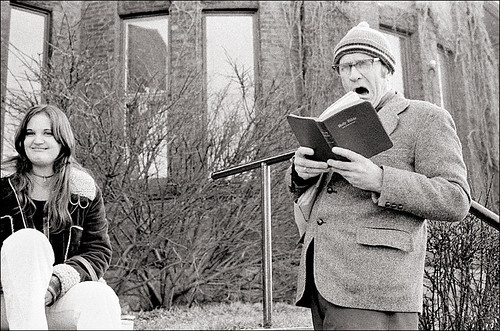
Here are Damien's questions and Robert's responses. I'd like to thank both of them for their time and generosity, particularly Robert for sharing his art, his experience, and for inspiring us to capture life and share it with others.
Damien - Street photography is candid by nature, but do you set out wandering the city with any specific goals or is your process more organic, with you simply living your day to day life and capturing interesting moments as they happen around you? What interests you enough to take the picture when you're out on the street? Is it a face of a passerby, the context of the moment, or something else?
Robert - Street photography has known themes that are often repeated. By viewing hundreds or perhaps thousands of images you can almost pre-program your mind to react to a situation on a subconscious level. The trick is to be so prepared to shoot that it is almost an afterthought. The mental preparation I did back in my prime shooting days out numbered my time on the streets by far. I believe that the reflexes involved in Street photography are very close to that of an athlete. Pure hand, body and eye coordination. Those reflexes do fade over time and a different type of timing takes it's place.
D - Do you have a preferred lens/camera setup that you use primarily? Are you trying to keep a low profile with your equipment, or does an interaction with the subject who knows they're being photographed bring something to the image?
R - I have always been a one camera and lens guy. After much experimenting I found that keeping it simple was the best way to go. An SLR with a 50mm lens loaded with TRI-X and I was ready to hit the streets. I am not a shy person and relished the interaction involved in photographing strangers. Candid photography now is almost too easy. The interaction with your subjects can play a useful role in forming a powerful image.
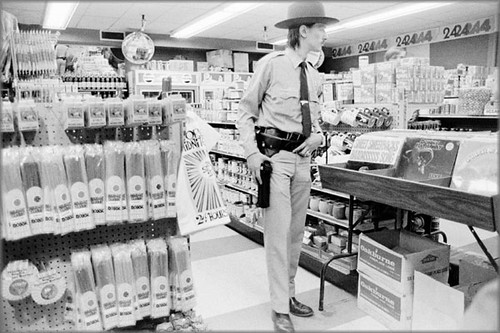
D - Can you describe how your choice of equipment has evolved (or hasn't) over the years? For example, have you embraced digital over film, or do you use both? It seems like digital technology would make street photography much more immediate to share, but is that even one of your goals?
R - I think I'm up to my fifth digital camera now. I like the Panasonic LX3. Using it in the wide angle mode at 24mm is a challenge that I enjoy. I have taken to shooting from moving vehicles and that really adds to the random look of my work these days. It can produce some interesting images. It is real easy to shoot tons of crap; the secret is editing your work as it has always been.
D -You also photograph in color. As someone who has described themselves as a black and white documentary photographer, what made you incorporate the use of color?
I think I have always had a good eye for color. I added that specific reference to B&W when I put my first photography site up some ten years ago and it stuck. Google Black & White Street Photography and you should find me.
D -Street photography has come under scrutiny in some parts of the world, especially the U.K., where photographers on the street have had equipment taken by the authorities and even been arrested. Have you ever encountered a negative experience such as this, and has the response towards you while you're shooting changed since the 70's? Also, what words of advice would you impart on aspiring street photographers today? Especially within the context of heightened security and paranoia in our urban areas.


R - I sometimes take the new restrictions as a challenge and shoot from the hip at local stores. Last week I stopped to take pics outside of a power plant and expected visitors. It didn't happen but I thought about it on my way home. Street photographers are doing society a favor documenting everyday life, don't ever forget that!
D - Have you ever been interested in any other avenues of photography, such as traditional portraiture, fine art or commercial work? If not, what do you get from your documentary images that those other categories wouldn't fulfill?
R - My first intentions with photography was to take pretty images and get rich. After being exposed to the work of the masters those thoughts soon faded. Instead I chose to get good at a type of photography that for the most part has no monetary value! The best thing that ever happened to me through my photography is my 30 year marriage and three wonderful sons.
D - You have a substantial list of links on your website to other's work and organizations that support the arts. Are there any photographers or artists that you look to for inspiration on a regular basis?
R- I am always amazed with the quality of work that I encounter on Flickr. I have had some contacts with most of the sites and photographers that I have on my link page and can say that I respect all of them. (Here's a link to Robert's Flickr contacts page.)
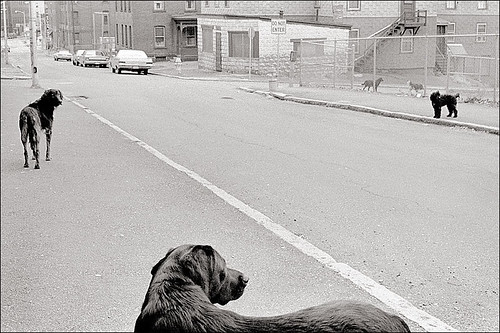


2 comments:
Great stuff! Thank you Eric and Robert.
Thank you for this interview.
I remember seeing some of these images on flickr a few years back and these (among others) really started my interest in the genre - so thank you again ;)
I really love the "purity" of these images: they contain just the right elements to work - nothing more, nothing less. Great.
Post a Comment